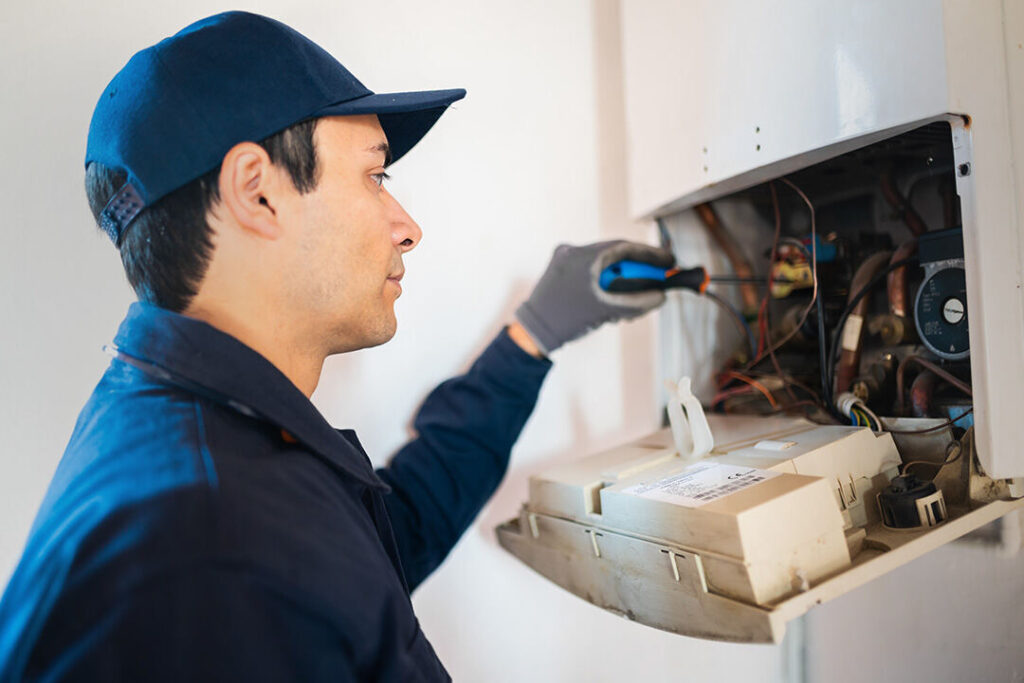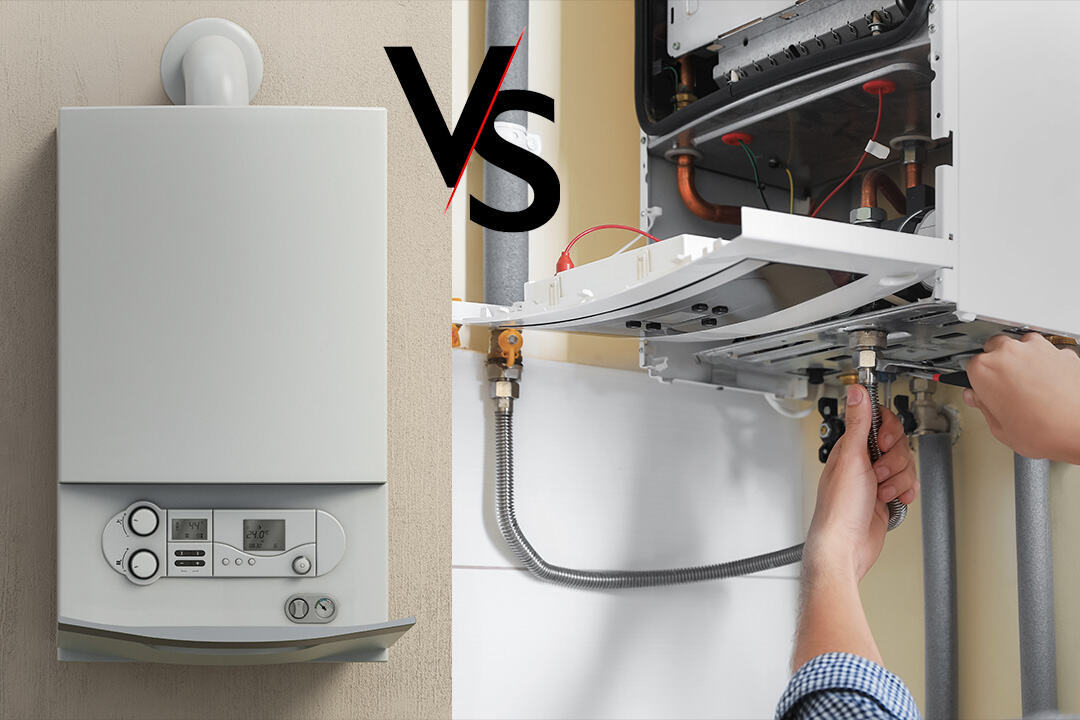Table of Contents
When winter is approaching, nothing else makes one feel great, considering a comfortable, reliable boiler. But it is more than just having warmth; with a good boiler, you can breathe freely and feel safe from the side effects of cold along with your family. So what happens when that reliable boiler is now showing signs of wear? Should you spend your money to repair it or to install a new one? This decision can be pretty overwhelming with all that information surrounding it.
In this article, we are going to discuss boiler repairs versus boiler replacement. We are discussing some critical signs that will make you realise whether it is time to find your heating system some minor maintenance or say goodbye to the old unit and get a new boiler installation. Knowing the pros and cons of each along with some critical factors like cost and long-term benefits will help you identify which one is best suited for your home and budget. So, let’s get started!
The Importance of a Functional Boiler
A boiler is the core of a comfortable home. With it, you get to enjoy warmth when the chilly months come. Thus, you stay warm and cosy inside with your family. It doesn’t just provide warmth, however. It supplies hot water for bathing, cooking, and cleaning. An efficient boiler is absolutely necessary for daily routines. A defective boiler can be dangerous because there may be carbon monoxide leaks. Maintenance of a heating system will not only protect an investment but a person’s health also. A working boiler also contributes to energy efficiency. When systems are working correctly, fuel is burned at a lower rate, and decreases utility bills over time.
To summarise it, a functional boiler means neither comfort nor any other thing; it stands to ensure a safe and efficient living environment for each and every member of the household.
Signs Your Boiler Needs Repair or Replacement
A well-running boiler is indispensable for warm and cosy heated homes, but there are several signs that may indicate some form of attention being required on the boiler.
- Unusual Noises: First of all, listen for odd noises. If your boiler does start producing banging or whistling sounds, then this may indicate that something is going on inside the boiler.
- Cold Spots: Next, look out for some spots of cold radiators, which can point that the air has been trapped, or that some other form of malfunction has developed which is affecting the heating flow.
- Increase Energy Bills: This is another sign that should alarm the presence of issues with your boiler. Most boilers will consume more fuel than usual when they are having a problem.
- Pooling of Water: Look for leaks around your boiler. Pooling of water near the boiler often indicates big problems that require urgent action.
If your boiler system breaks down often or requires to be repaired very often, then it might be the time for you to consider a replacement rather than to keep patching it up.
Upgrade Your Boiler Today!
Pros and Cons of Repairing a Boiler
While repairing your boiler may seem practical at first glance, weighing these pros and cons carefully will help guide your decision-making process when faced with heating issues in your home.
Pros | Cons |
Lower Initial Cost | Temporary Fix |
Preserves Existing System | Reduced Efficiency |
Quicker Process | Potential for Further Issues |
Environmentally Friendly | Limited Lifespan |
Pros and Cons of Installing a New Boiler
There is always uncertainty about whether you will choose the right model or size for your home needs. Making an informed decision can feel overwhelming amidst all available options.
Pros | Cons |
Increased Efficiency | Higher Initial Cost |
Longer Lifespan | Disruption at Home |
Lower Carbon Footprint | Potential for Installation Issues |
Improved Comfort |
Factors to Consider Before Making a Decision

Several factors will weigh in on the decision to repair the boiler you have or install a new one.
- How Old Your Existing Boiler Is: If yours is an older model that is nearing the end of its cycle, it might not be worth the fix.
- Assess Energy Efficiency: Newer boilers use technology that saves a lot of energy while consuming less of it; hence, you will save considerable amounts in the long run.
- How Frequent Your Boiler Needs Repairs: Judge how many times the equipment needs repairs within the past couple of years. When you call for service once a year, then something might be wrong.
- Safety Features: Safety features must not be ignored. Better safety measures against possible dangers come with new units nowadays.
- Warranty Options & Maintenance Plans: Another thing to consider is what warranty options and maintenance plans are available for new installations and repairs; it may cost money in the short term but it will provide peace of mind during those colder months.
Cost Comparison: Repair vs. Installation
Many factors apply when weighing the costs of repairing a boiler versus installing a new one. Lower immediate expenses usually go to repairing an existing unit. Simple fixes tend to be affordable, especially concerning minor issues. Keep in mind that frequent repairs will really account for money that could be spent on several things in just a matter of time. Your boiler is bound to experience frequent breakdowns if it has had an ongoing problem. Maintenance might be costly for you if your boiler has frequent breaks down history. On the contrary, a replacement boiler costs more in terms of up front. However, this may be offset through energy efficiency as well as savings on utility bills in the long term.
Factors | Repair | Replacement |
Initial Cost | Lower | Higher |
Long-Term Cost | Potential for increased energy bills due to decreased efficiency | Lower energy bills due to higher efficiency |
Environmental Impact | Less environmentally friendly (contributes to waste) | More environmentally friendly (reduces carbon footprint) |
Convenience | Less disruption | Potential for more disruption during installation |
Future Maintenance | May require more frequent repairs | Lower maintenance needs |
The Long-Term Benefits of Installing a New Boiler
Choosing to install a new boiler also boosts the resale value of your home. Prospective buyers appreciate updated appliances that promise lower maintenance costs and improved efficiency over older systems.
- More Energy Efficiency: The new boilers are much more energy efficient compared to the older boilers, since energy usage occurs only a few times over a long period of time.
- Low Carbon Footprint: The new boilers produce less quantity of greenhouse gases in the environment.
- Increase Comfort: A new boiler gives you an uninterrupted supply of heating and hot water facility that can add comfort to your home.
- Long Lasting: Boilers nowadays have a longer lifespan that minimises lengthy processes like replacing them.
- Free Government Grants: Depending on your circumstances, you may be eligible for government grants to help cover some costs.
- Peace of Mind: There will be peace of mind with a new boiler knowing your heating system is going to be efficient and reliable.
- Increase Your Property Value: A modern, high-performance boiler has the potential to boost the value of your house.
Conclusion
There are a number of considerations when you decide between boiler installation and boiler repair. A working boiler is extremely crucial in keeping your home at bay. This, of course, happens particularly during the adverse conditions of extreme coldness. Recognizing the signs that prompt you to believe your boiler needs attention will save you from this kind of unpleasant breakdowns. Repairing a boiler may seem cheaper for some time, but the long-term effects could be something else. Generally, an older unit may still mean less efficient boiler and, thus higher bills until paid for, at least. On the other hand, a replacement boiler usually saves more money with better energy efficiency and thus lower running costs in the long run.
Frequently Asked Questions
If your boiler is either old or has been inefficient, or it has been breaking down all too often, then replacement could be the answer. A new boiler brings improved energy efficiency, which would serve to lower running costs as well as lower carbon emissions.
The cost will depend on the specific problem, the age of your boiler, and maybe the complexity of the job. Broadly speaking, a boiler repair is less expensive than boiler replacement upfront, but a new boiler may pay for itself eventually as it has an increased efficiency.
The time for replacing a boiler varies, but generally it depends on how complex the installation is or if the stock is available. However, for most cases, the replacement takes just a few days.
Yes, a government grant for energy-efficient boilers pays for a new boiler installation for homeowners. This makes boiler installation significantly cheaper.
Many new, energy-efficient boilers offer benefits such as lower bills, reduction in carbon emissions, comfort, and an increase in property value. Other new, modern boilers come equipped with smart features that allow you to control your heating system from miles away.



